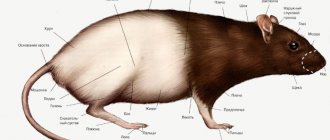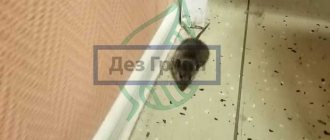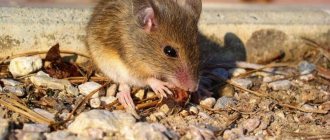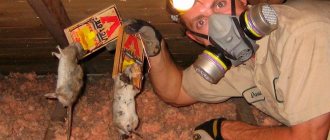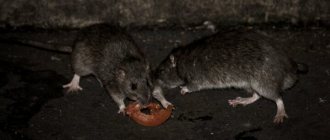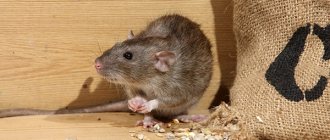Reasons for the appearance of mice in the apartment
With the onset of cold weather, mice settle in country houses and can enter city apartments. They do not manage to take root everywhere: if you have a cat, cleaning is done regularly, food is put away - the animals will have a hard time. For a comfortable life, rodents need:
- Dirt and disorder. If people in the apartment eat not only in the kitchen and do not remove crumbs and leftover food, rodents will easily find food.
- Cluttered space. When the room is littered with boxes, furniture and things, mice make nests and move freely, because at any moment you can find shelter under a box or cabinet. When the population grows, some of the rodents leave to look for a new home in a neighboring apartment.
Mice can get into an apartment by accident - they arrive along with new furniture or household appliances, which means that no one is safe from the appearance of mice.
Favorite habitats of mice
In an apartment, mice choose secluded corners and build nests there. They prefer to live:
- behind a suspended ceiling;
- in lockers on the balcony;
- behind plasterboard sheathing;
- under the bath;
- on mezzanines;
- in upholstery of sofas and upholstered furniture.
Lures
This folk method of fighting rodents at home involves the use of poison for mice. It is recommended to use it only in case of mass reproduction of pests or when all other methods have proven useless.
To make poison for mice, you can use the following recipes:
- Mix 200 g of grain, 200 g of sugar, 500 g of gypsum and 60 ml of sunflower oil. Based on these components, prepare a homogeneous mass and spread it near rodent burrows. Mice, attracted by the smell of the grain bait, consume it. Subsequently, the mass in the stomach hardens, which leads to blockage of the digestive system and the death of the rodent.
- Mix equal amounts of soda, starch and sugar. Place bait near the rodent habitat. When the pests eat the mixture, a toxic gas is released in the stomach, causing intoxication.
- You can prepare poisoned grain by mixing it with putty in equal quantities. The resulting composition should be poured onto paper and placed near the mice holes, and containers with water should be placed nearby.
Why are mice dangerous?
Rodents spoil food supplies - they eat and stain cereals, flour and sugar with their feces. They make nests in sofas and upholstered furniture, chew through wiring and plastic pipes, and chew holes in walls and decorative panels. The design of their body allows the animal to crawl into the smallest hole and breed there.
Mice carry infections that are dangerous to humans:
- pseudotuberculosis;
- vesicular rickettsiosis;
- leptospirosis;
- tularemia;
- plague
Some infections are transmitted through mouse feces, others through fleas, which can pass from mice to humans.
Essential oils
Essential oil has a more concentrated aroma
. Essential oils are more effective than fresh plants, since their smell is stronger and more pungent, and it no longer dissipates. What smell do mice hate?
- Peppermint, Japanese peppermint or menthol;
- Pharmaceutical chamomile;
- Sagebrush;
- Thyme;
- Coriander.
Important! When choosing a scent, it is worth considering that the essential oil will affect not only mice, but also people. For example, mint is contraindicated for people suffering from low blood pressure.
Essential oils can be used in different ways:
- Place 2-3 drops of oil on a rag and place it near the hole or in the places most popular with mice;
- Mix 50 ml of vegetable oil and a few drops (no more than 20) of essential oil, wipe with the mixture all the places where pests go;
- Mix 400 ml of water, 10 ml of alcohol and up to 15 drops of oil in a spray bottle, shake well and spray in corners and along the walls;
- Add a few drops of oil to soapy water for cleaning floors. Soap in this case is necessary to retain the smell.
As the smell evaporates (the aroma lasts from 2-3 to 5-7 days), it is necessary to update it.
Basic means and methods of control: how to get rid of house mice?
The centuries-old history of rodent control offers different ways to solve this problem. Modern, more effective and humane ones have been added to them.
Good old mousetraps
A mechanical mousetrap with bait is a traditional way of catching mice. The downside is that the mousetrap must be checked regularly in order to change the bait and not miss the moment when you can throw away the mouse corpse. A curious cat can seriously injure its paw if it tests the mousetrap.
Folk remedies
Mice don't like the smell of some plants. As an additional rodent control measure, you can hang bunches of dried plants around the house:
- black elderberry;
- chamomile;
- wormwood;
- peppermint;
- tansy;
- bay leaf.
Mice cannot tolerate the smell of bleach, ammonia and vinegar - they can be added to the water when carrying out wet cleaning. Boric acid is spilled near mouse holes and the animals have to leave them.
Rodents cannot tolerate loud noise. If you give them a sound attack for several days, they will leave. This method should not be used in a city apartment.
A poison is prepared for mice: sugar, flour and plaster are mixed. The diluted pulp clogs the intestines of rodents. Another treat option: a mixture of grain, flour and quicklime. It is important that children and pets do not have access to this mixture.
Homemade traps
You can make your own trap and, if it goes off, you will strike a blow to the mouse family. Not significant, but still.
"Under the Hood"
The bait is placed inside the pan. The rodent gets inside, but can no longer get out on its own.
Glue traps
Construction adhesive with bait is applied to a board or thick cardboard. You can purchase a ready-made trap with a special composition. The good thing about this method is that you don’t have to look for a poisoned mouse in the wall and suffer from an unpleasant odor. But such a device cannot be used if there are children and pets in the room.
Water trap
The bucket is 2/3 filled with water. A strip of cardboard with bait is attached to its edge. When the animal goes for the bait, the cardboard will bend under its weight and it will fall into the bucket.
Ultrasonic repellers
An electrical device emits ultrasound, inaudible to humans, but unbearable to rodents. To ensure that your country house is free of mice, it is recommended not to turn off the device for a whole month, with the exception of short breaks. Then turn it on prophylactically for 2-3 weeks. In addition to the rather high cost, some users note a deterioration in their mood while using the device.
Cats and dogs
The smell of a cat alone scares mice. If the cat is not lazy, he catches rodents, and the surviving individuals prefer to go home. Renting a cat is not always effective - the animal may experience stress when moving and refuse to hunt.
Many dog breeds also catch mice. The Miniature Schnauzer was bred to be a rat catcher and mouse catcher: the dog strangles rodents, but does not eat them.
When a cat or dog brings you prey - a strangled mouse, do not pick it up with your hands! The rodent can feign death, and when wounded, it becomes very aggressive and can bite a person.
If your goal is simply to get rid of mice and not to get a pet, then it is better to choose a different method of rodent control.
Professional deratization: removal of mice with a guarantee
If you are afraid of mice, do not want to pull their corpses out of traps and look for the decaying bodies of animals that have eaten poison behind the cladding and on the mezzanine, entrust the fight against rodents to professionals. Obviously, the pest control service costs more than a mousetrap, but you can forget about the problem.
When exterminating rodents, we use different methods of control:
- mechanical - installation of traps and mousetraps;
- chemical - gassing the premises with repellent pheromones and using drugs to regulate the rodent population;
- comprehensive – the most effective.
Professionals inspect the property and formulate a pest control plan depending on the scale of the problem. Specialists find and eliminate cracks and passages through which animals enter the apartment.
All drugs used are safe for human health. The action of each of them is designed for an average of 3 weeks. This means that once the mice are killed, they are guaranteed not to appear again for three weeks.
Do mammals respond to sound?
Oddly enough, rats and mice are very scared of loud noises. Animals will not live in a house where music is playing loudly, or a drill or other power tool is running.
Another way to repel tailed pests is with ultrasonic devices. High cost is their main drawback. Pests cannot withstand the ultrasound generated by the device, so they rush to leave the room as soon as possible. These sound waves are not perceived by the human ear, and therefore are completely safe for health.
To obtain the desired result, it is important to choose the right ultrasonic rodent repeller. Its power must correspond to the area of the room. Otherwise, it will not be possible to get rid of rodents. An equally important nuance is the ability to change the frequency of the signal, since the same sound can cause addiction in parasites.
Preventing the appearance of mice in the apartment
To prevent mice from choosing your apartment, proceed as follows:
- Store cereals, sugar and flour in containers with tight-fitting lids. Mice definitely won’t chew through glass and metal containers;
- take out the trash every day;
- do not leave crumbs after meals and eat only at the dinner table;
- do not leave dirty dishes in the sink;
- check the tightness of the mesh on the ventilation holes;
- If you find holes in the wall or cracks in the floor, seal them. You can put a mixture of plaster and broken glass inside;
- You can wash the floor with water with the addition of essential oils of mint, wormwood or bay leaf.
If preventive measures were not enough and you decided to deal with uninvited guests quickly and safely, call the phone number listed on the website or fill out the feedback form. The company’s specialist will advise you on the exact cost of exterminating mice and book a specialist visit at a date and time convenient for you. We are ready to quickly rid you of hated rodents 24 hours a day, seven days a week!
Are rodents afraid of water?
Neither mice nor rats are afraid of water, as they are able to stand on it perfectly. Gnawing creatures swim no worse than their aquatic counterparts, however, at every opportunity they strive to get onto land as quickly as possible. The exception is water rats and other types of rodents that settle along the banks of reservoirs.
Therefore, when deciding to get rid of rodents using water traps, it is necessary that their internal walls are smooth and slippery. Once caught in such a water trap, the animal will not be able to get out of it.
Stronger odors
You need to wash the floors and wipe the furniture with a vinegar solution.
We are talking about more unpleasant, harsh aromas that people will not like. They will scare away mice from the apartment for a long time:
- Ammonia or ammonia. A little ammonia needs to be dripped into a container and placed near the entrance to the hole. You can also add 10 ml of ammonia to a liter of water, wash all surfaces (floors, tables, windowsills) with the solution;
- Vinegar: It is also used as ammonia;
- Birch tar from mice in the house, kerosene, gasoline, motor oil: these smells quickly make mice leave the place and run away for a long time. It is necessary to moisten the rag and leave it where rodents are most often. It is important to remember that these odors are difficult for humans to tolerate, and therefore it is better to move out of the apartment for a while. They are also perfect for repelling pests in non-residential premises;
- Bleaching: almost all pests cannot stand this smell. It is necessary to wash the floors 3-4 times a week using chlorine until the mice disappear completely.
But these are far from the most poisonous and toxic substances. Some options are not recommended for use in apartments due to their strong odor; they are suitable for cottages, cellars and attics. What poisonous smell are mice afraid of?
- Burnt fluff or wool;
- Naphthalene;
- Burnt rubber, such as tires;
- Colognes produced in the USSR;
- Smoke bomb or feed sulfur: they affect the mucous membranes of the mouth, nose and eyes of animals, poisoning them.
Before using strong agents, it is necessary to vacate the room from people and close it for 5-7 days so that there is no influx of fresh air. There is no need to ventilate the room; the smell should disappear on its own.
Important! When working with strong odors, it is necessary to protect the respiratory tract with a respirator or gas mask.
